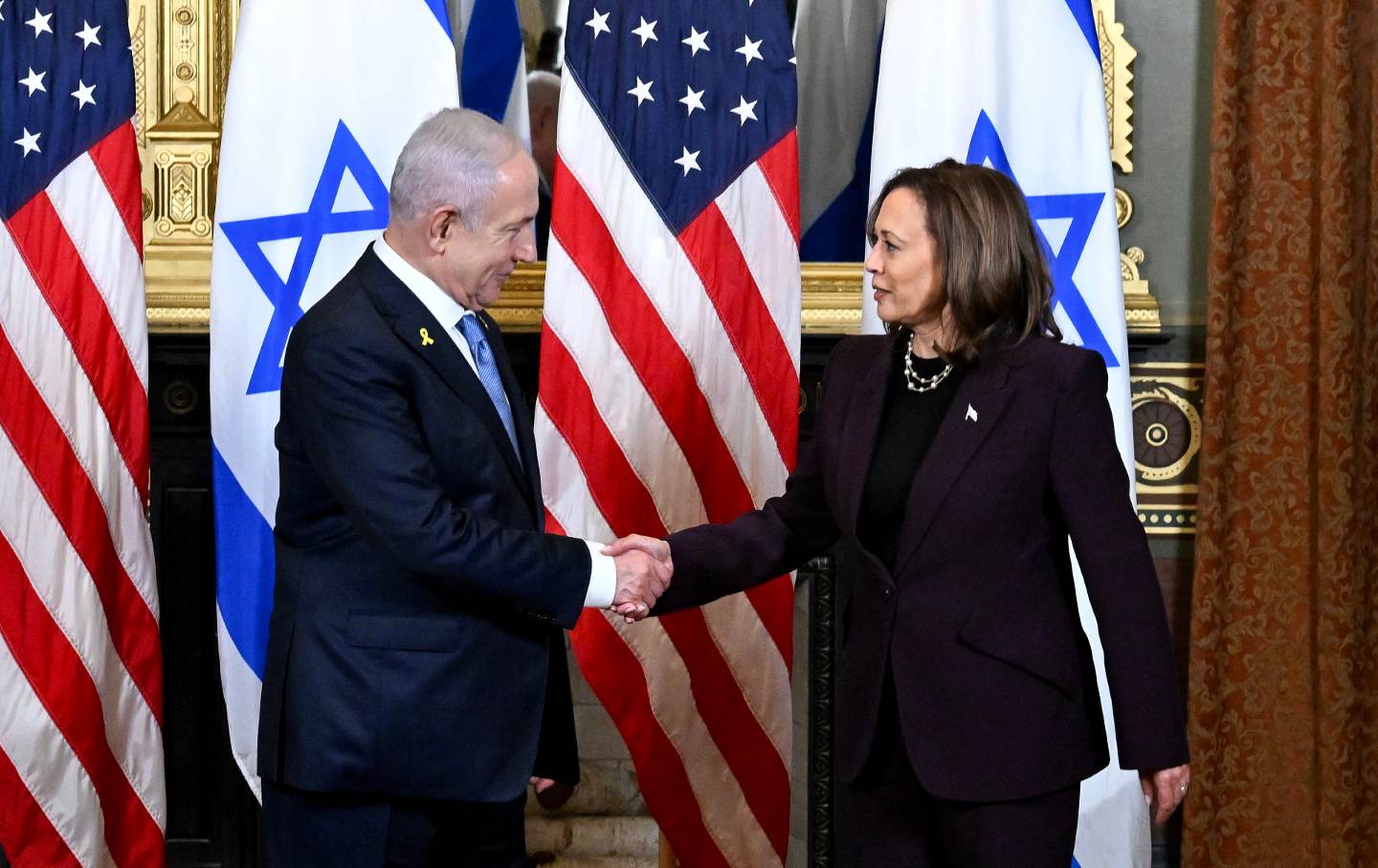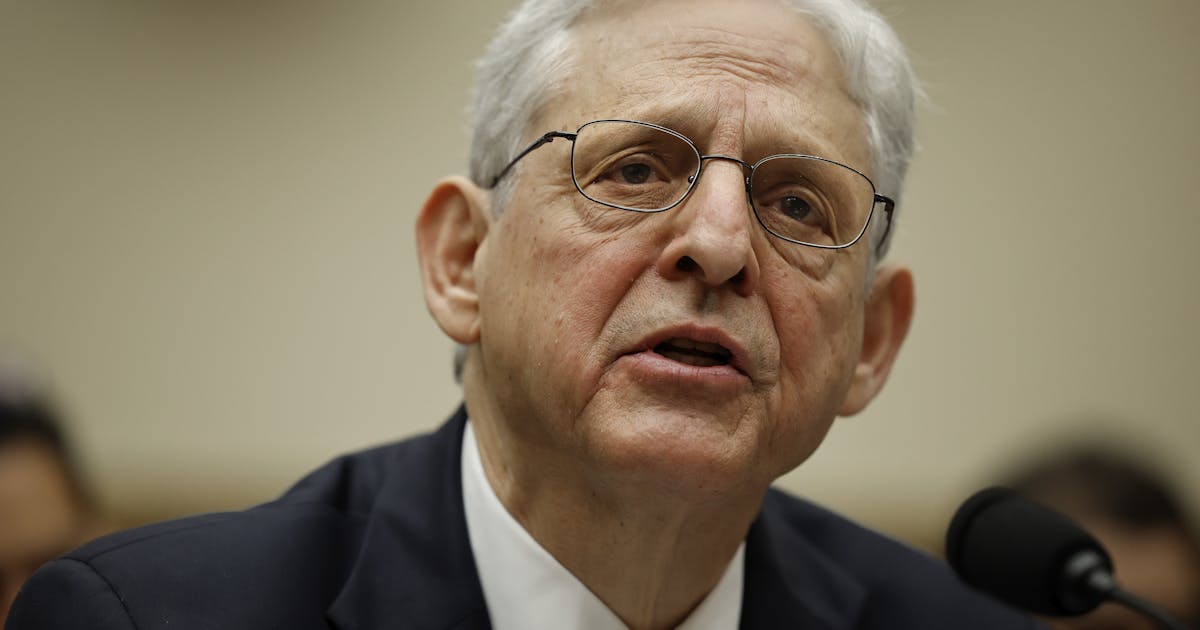The vice president’s ascension provides an opening for a new approach to the horror in Palestine. But it won’t happen without sustained political pressure.
Benjamin Netanyahu and Kamala Harris shake hands during a meeting in the Vice President’s Ceremonial Office in Washington, DC, on Thursday, July 25, 2024.
(Kenny Holston / The New York Times / Bloomberg via Getty Images)
Vice President Kamala Harris’s sudden ascension to the top of the Democratic presidential ticket has not only transformed the 2024 election. It has also provided the biggest opportunity in months to get Democrats to change their cruel and discredited approach to the war in Gaza.
In light of such an unprecedented moment, with the war still raging and the prospects of regional escalation in the Middle East as high as they’ve ever been, the need for a comprehensive reset on the Democratic Party’s policy toward the Palestinian struggle for self-determination and freedom is paramount. It is clear what anyone who cares about this issue must demand right now: that Harris tells the American public and the world that Israel can no longer occupy Palestinian land and impose apartheid on millions while enjoying US support and protection from accountability. But we must be equally clear that Harris will not do any of these things without sustained, relentless political pressure from the movement for Palestine.
The last 10 months of destruction and carnage, in which the Israelis have killed more than 40,000 civilians and displaced 2 million more, have been a humanitarian catastrophe. They have also been a political disaster for the Democrats. Poll after poll shows that the demand for a ceasefire is mainstream, with voters more likely to cast a ballot for a Democrat who expresses clear support for one than a Democrat who mirrors the Republican on the issue. More than 45 percent of voters who expressed support for the Biden-Harris ticket say that military assistance to Israel should be decreased. The campaign for the “uncommitted” ballot option in states like Michigan, New Jersey, Minnesota, Rhode Island, and Washington enabled Democratic voters in the hundreds of thousands, alongside professional organizers and activists, to express opposition to Biden’s unconditional support of Israel’s occupation and apartheid system.
The Biden administration’s approach to Palestine, from his first day in office to the beginning of this war, has sadly been quite similar to that of Trump’s. Taken in by the ridiculous belief that the Palestinians and their national aspirations could be indefinitely brushed to the side, Biden chose to affirm the bad logic of Trump’s Abraham Accords and pursued a normalization deal between Israel and Saudi Arabia. Instead of restoring policy that adhered to international standards, Biden instead backed Trump’s decision to recognize all of Jerusalem and the Golan Heights as Israeli territory. As of this writing, Biden still has not overturned the Trump administration’s policy of labeling products from Israeli settlements in the occupied West Bank as “made in Israel.” While the State Department routinely offered rhetorical support for a two-state solution, the president has used his veto power at the UN to block Palestinian bids for representation. These are conservative positions that have been upheld by a Democratic president, and it is imperative that whoever succeeds Biden takes up a different approach.
The few key areas where we’ve seen some substantive change have all primarily come about because of our efforts as organizers and activists. Without the vital Ceasefire Now Resolution by Representatives Rashida Tlaib and Cori Bush, and the No Money For Massacres campaign sponsored by the Democratic Socialists of America to support it, how many members of Congress would have come out in favor of a ceasefire early on? Without the comprehensive efforts of Arab Americans in the state of Michigan to express their anger, would a single sanction have been imposed on Israeli settlers in occupied Palestine? And without the Uncommitted campaign and subsequent international developments surrounding the recognition of Palestine by various European powers, would the administration be seriously contemplating sanctions on Israeli ministers today? It is because of these organizing efforts and the tireless work of Palestinian Americans and their allies that progress has been made at all.
In a post-Biden Democratic Party, those who organize for Palestinian liberation must take up a cautiously optimistic but nonetheless realistic view of the terrain ahead of us. Harris does not appear to be nearly as ideologically committed to Zionism and defending Israel as her boss, who is 22 years older than her and was raised in an environment where Palestinians were hardly perceived, let alone viewed as having legitimate grievances or demands. It has been reported that Harris was one of the leading figures in the White House urging the president to give a higher priority to Palestinian concerns.
Current Issue

At the same time, her team has been quick to tamp down any suggestion that she meaningfully disagrees with Biden’s approach. (“The difference is not in substance but probably in tone,” a Harris adviser told The Nation’s Joan Walsh in a recent profile.) Therefore, while Harris could be less resistant to pressure on Gaza than Biden, she will still, as she might put it, be operating in the context of what came before her. It is up to us, the organizers and activists, to make it so that the future Harris administration not only can but must hold Israel to account—not just with words but with real action.
The Uncommitted National Movement has indicated that it will back any candidate at the convention and mobilize voters on their behalf in November so long as that candidate backs a permanent ceasefire and an arms embargo. In its statement, the movement wrote:
Supplying weapons to Netanyahu’s regime makes a mockery of Democrats’ claims to fight against MAGA authoritarianism. By funding a government committing human rights abuses, we undermine our party’s stance against far-right extremism and contradict our commitment to democracy.
It’s time to align our actions with our values. Vice President Harris can start the process to earn back trust by turning the page from Biden’s horrific policies in Gaza.
We should also make clear that we demand much more. In 2020, the Democratic Party for the first time adopted a clearer line of opposition to settlement expansion in occupied Palestine in its party platform, but failed to lay out that it was a project backed by the Israeli state. Biden, who was then the presumptive nominee and thus had effective veto power over key parts of the platform, also vetoed language declaring that Palestinians had the right to live “free of occupation.” A series of additional amendments intended to demonstrate support for the Palestinian aspirations for freedom and equality were also shot down by the Biden campaign. This time around, Representative Tlaib and the Uncommitted movement have made it clear they intend to have an up or down vote at the Democratic National Convention on an arms embargo.
In our view, a future Harris administration should not just impose an arms embargo on the Israeli government but also declare that the United States agrees with the International Court of Justice’s finding that the occupation of Palestine itself is illegal. In line with this, she should move to expand the sanctions regime to include sanctions and travel restrictions on Itamar Ben-Gvir, Belazel Smotrich, and other senior members of the Israeli government who actively perpetuate the conditions of apartheid on Palestinians. And if she’s serious about her belief that settlements violate international law, then she should impose a comprehensive trade embargo on settlements and the consumer products made within them. Finally, the Harris administration should unilaterally recognize the State of Palestine, with East Jerusalem as its capital, and support its ascension to the United Nations so as to bolster its position in future negotiations.
These are mainstream positions, in line with the standards of international law and consensus, and they should be adopted and enacted by any Democratic administration that purports to believe in a just peace settlement. So long as the United States, whether a Democratic or Republican administration governs it, is primarily focused on protecting the State of Israel and its agenda at the expense of the Palestinians, it will never be able to help resolve the conflict.
In remarks delivered shortly after meeting with Prime Minister Netanyahu on Thursday, Harris said, “We cannot look away in the face of these tragedies [in Gaza]. We cannot allow ourselves to become numb to the suffering and I will not be silent.” These are welcome words, and they demonstrate that she is able to rhetorically project empathy for Palestinians where Biden has not, but they are still just words. Stirring speeches are hollow and meaningless so long as the United States remains one of the facilitators of Palestinian suffering. It is time for the Democratic Party to face the one-state reality head-on. Harris has the chance to enact real change for the better if she wins in November, but we cannot rely on her to do it out of the goodness of her heart. History has shown us that it will take pressure, coordination, and a principled movement for Palestinian liberation to move her closer to our position.
Thank you for reading The Nation
We hope you enjoyed the story you just read, just one of the many incisive, deeply-reported articles we publish daily. Now more than ever, we need fearless journalism that shifts the needle on important issues, uncovers malfeasance and corruption, and uplifts voices and perspectives that often go unheard in mainstream media.
Throughout this critical election year and a time of media austerity and renewed campus activism and rising labor organizing, independent journalism that gets to the heart of the matter is more critical than ever before. Donate right now and help us hold the powerful accountable, shine a light on issues that would otherwise be swept under the rug, and build a more just and equitable future.
For nearly 160 years, The Nation has stood for truth, justice, and moral clarity. As a reader-supported publication, we are not beholden to the whims of advertisers or a corporate owner. But it does take financial resources to report on stories that may take weeks or months to properly investigate, thoroughly edit and fact-check articles, and get our stories into the hands of readers.
Donate today and stand with us for a better future. Thank you for being a supporter of independent journalism.
More from The Nation
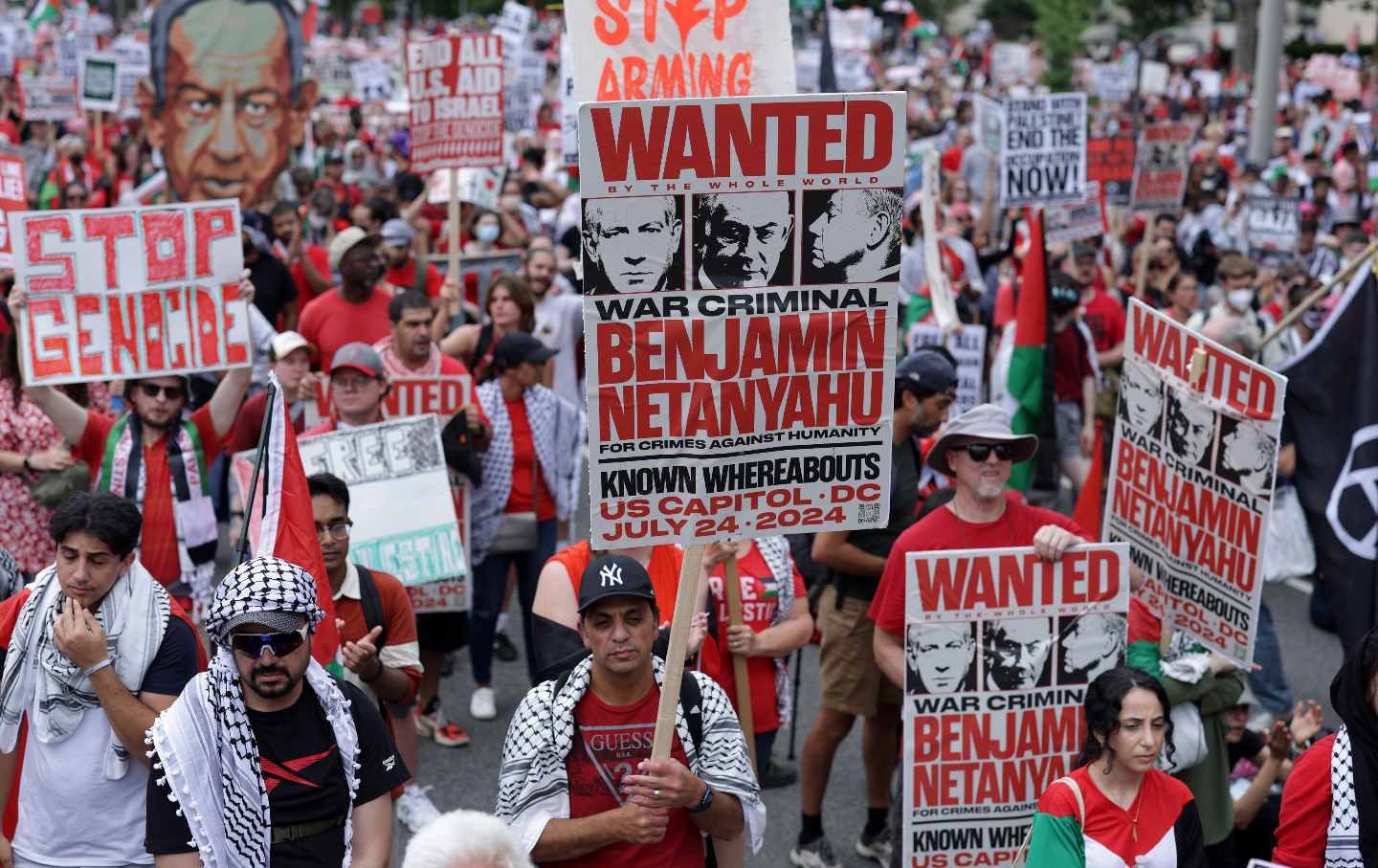
The Israeli prime minister rebuked criticism during his speech to Congress, but not without protests from lawmakers, staff, congressional interns, and thousands of others.
StudentNation
/
Owen Dahlkamp
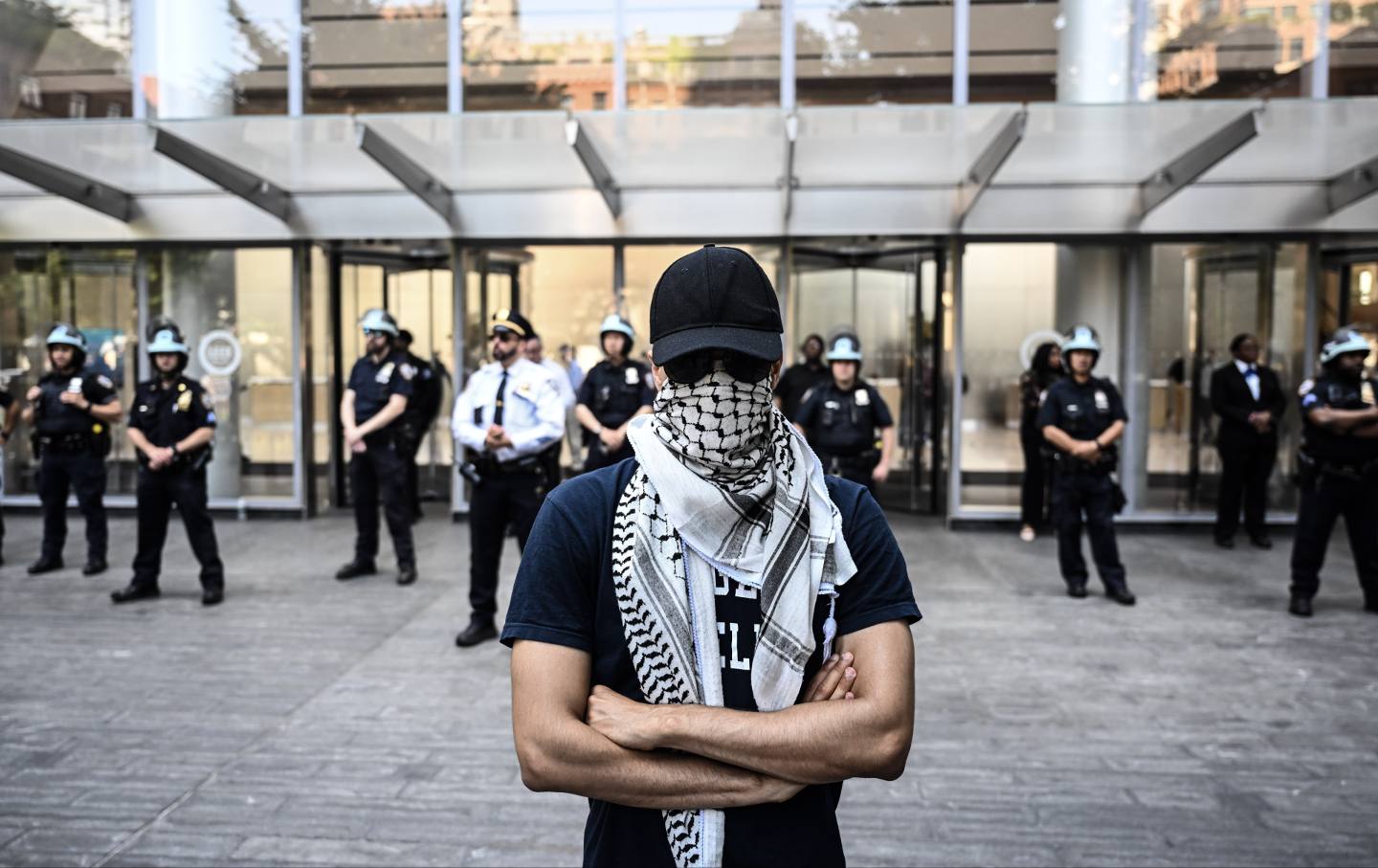
The iconic Palestinian scarf has been demonized as a symbol of Nazi-like hatred. This bigoted nonsense couldn’t be further from the truth.
Samaa Khullar
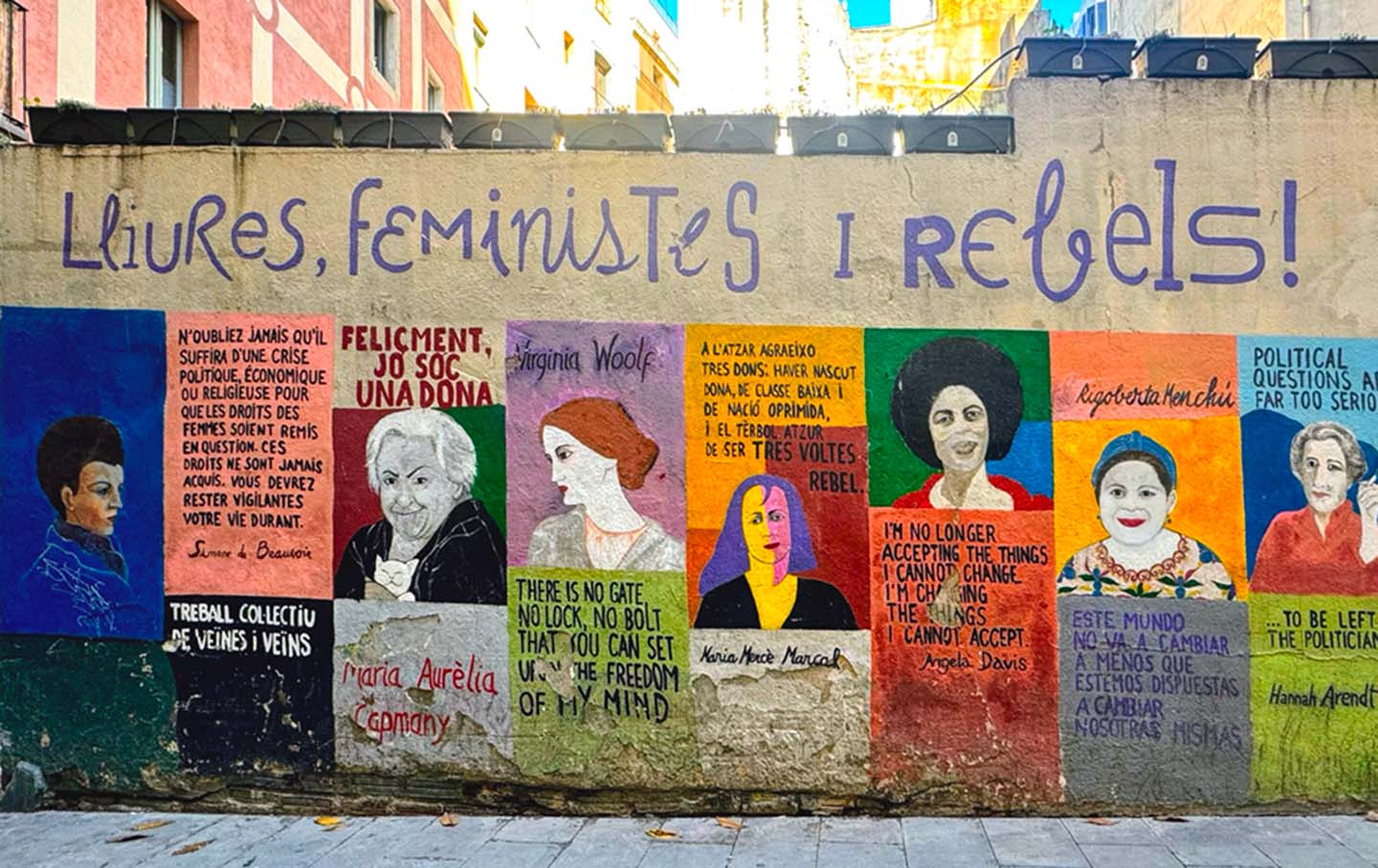
Notable women: portraits and quotes, street mural, Barcelona, Catalunya, Spain.
OppArt
/
Andrea Arroyo

A bitter foe of “pretend politics,” she always said she wanted “to teach people: Can we have the confidence to win?”
Obituary
/
D.D. Guttenplan

The Nation’s strikes correspondent believed that no one is coming to save us but us. And that we are enough.
Obituary
/
Katie Miles
